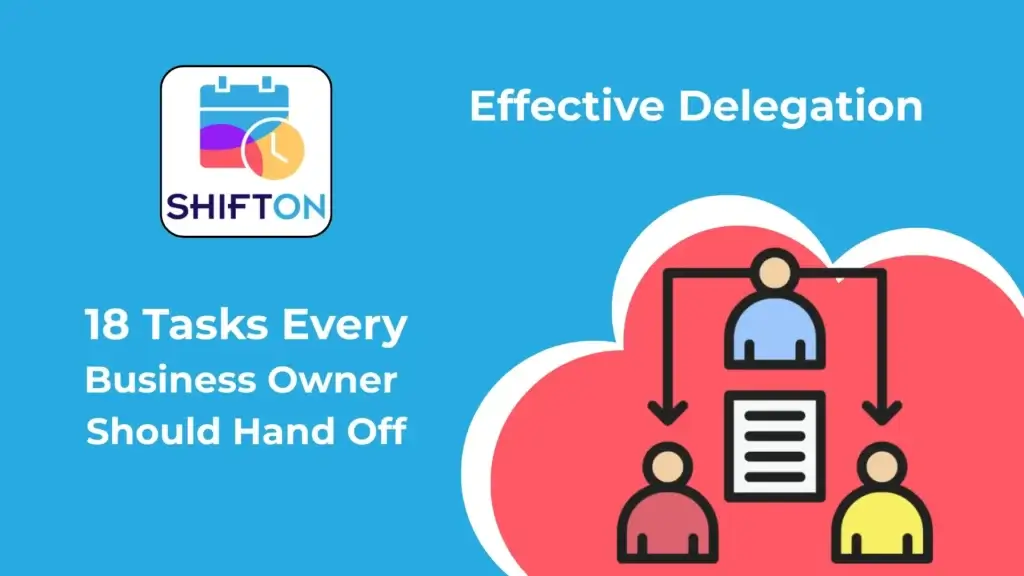What Is Delegation, And Why Is It Important?
Delegation is the process of assigning tasks to others while maintaining responsibility for the outcome. It allows business owners and managers to distribute workloads efficiently, ensuring that time and skills are used optimally. Without delegation, leaders risk micromanagement, which stifles employee growth and limits business scalability.When you delegate tasks effectively, you create an environment where employees take ownership of their work, improving productivity and morale. The right delegation strategy leads to smoother operations and allows leaders to focus on high-level decision-making.Delegate The Right Task To The Right Person
Delegation isn’t just about offloading work — it’s about assigning the right task to the right person. Consider each employee’s strengths, experience, and workload before delegating. If a task requires creativity, assign it to a team member with strong problem-solving skills. For detail-oriented work, choose someone meticulous. Matching tasks with the right people ensures efficiency and quality.Why Some People Are “Unable” To Delegate
Many business owners struggle with delegation due to common misconceptions and fears, such as:- Believing that “doing it myself is faster”
- Fear of losing control over quality
- Lack of trust in employees’ abilities
- Unclear instructions leading to poor results
Why Delegation Is Crucial
Failing to delegate leads to stress, missed opportunities, and inefficiencies. Delegation allows leaders to:- Focus on strategic growth rather than routine tasks
- Empower employees by giving them responsibility
- Improve time management and productivity
- Scale operations effectively without burnout
How to Delegate: Honing Your Skills With 9 Tips For Managers
| Tips | Description |
| 1. Know What To Delegate. Impart Clear Instructions And Expectations. | Identify tasks that don’t require your direct involvement. Ensure you provide clear guidelines, deadlines, and expectations so employees understand their responsibilities. Avoid micromanaging, but be available for support. |
| 2. Play To Your Employees' Strengths And Goals | Assign tasks based on an employee’s skills, strengths, and career development goals. This improves efficiency, keeps employees engaged, and fosters professional growth. |
| 3. Define The Desired Outcome | Instead of explaining every step in detail, focus on what success looks like. Clearly communicate the end goal and let employees decide on the best approach to complete the task. |
| 4. Provide The Right Resources And Level Of Authority | Ensure employees have the necessary tools, access, and autonomy to complete their delegated tasks. Without proper resources, they may struggle, leading to delays or errors. |
| 5. Establish A Clear Communication Channel | Keep an open line of communication for questions and updates. Use task management software to track progress and avoid unnecessary meetings. |
| 6. Allow For Failure | Delegation involves trust, and mistakes will happen. Create a learning-friendly environment where employees can improve from failures rather than fearing repercussions. |
| 7. Be Patient | Employees may take time to adapt to new responsibilities. Offer guidance, be patient, and provide constructive feedback to help them grow into their roles. |
| 8. Deliver (And Ask For) Feedback | Provide regular feedback to ensure delegated tasks meet expectations. Likewise, ask for feedback from employees on how the delegation process can be improved. |
| 9. Give Credit Where It's Due | Acknowledge and appreciate employees’ efforts. Public recognition and positive reinforcement encourage accountability, motivation, and team morale. |
How to Delegate Effectively On A Budget
Small businesses or startups often hesitate to delegate due to cost concerns. However, outsourcing to freelancers, using task management applications, or leveraging automation can be cost-effective ways to delegate without breaking the bank.18 Tasks You Should Delegate
Delegating tasks isn't just about freeing up time — it’s about optimising efficiency, ensuring high-quality work, and allowing your team to grow. Below are 18 critical tasks every business owner should consider delegating.1. Daily Time Management
Your time is one of your most valuable assets. However, managing your daily schedule — checking appointments, setting reminders, and prioritising tasks — can be time-consuming. A virtual assistant (VA) or personal assistant can take over this responsibility, ensuring you stay on track with meetings, deadlines, and commitments.Why Delegate It?- Eliminates time wasted on scheduling and rescheduling.
- Ensures you focus on high-impact activities.
- Reduces stress and decision fatigue.
2. Email Organization And Triaging
The average professional spends 28% of their workweek reading and responding to emails. A VA can filter important emails, respond to routine inquiries, and organise your inbox to ensure urgent matters get addressed first.Why Delegate It?- Prevents inbox overload.
- Saves hours each week.
- Improves response time for critical communications.
3. Scheduling Requests
Coordinating meetings, setting up appointments, and aligning schedules across multiple stakeholders can be overwhelming. A scheduling assistant or an automated booking system can handle these tasks for you.Why Delegate It?- Avoids double bookings and scheduling conflicts.
- Saves time spent on back-and-forth emails.
- Ensures optimised scheduling based on priorities.
4. Expense Management
Tracking business expenses, receipts, reimbursements, and monthly budgets can be complex and time-consuming. Outsourcing this to an assistant or using task management applications that automate financial tracking can make the process seamless.Why Delegate It?- Keeps finances organised and audit-ready.
- Reduces errors in expense reporting.
- Saves valuable time spent tracking and reconciling transactions.
5. CRM Management
Customer relationship management (CRM) tools are crucial for tracking leads, interactions, and follow-ups. However, manually updating records and analysing customer interactions is tedious. A CRM specialist or an assistant can handle this for you.Why Delegate It?- Ensures better customer engagement and retention.
- Automates follow-ups and lead tracking.
- Keeps client records accurate and updated.
6. Social Media Management
A strong social media presence is essential for brand awareness, but consistently posting, engaging with followers, and tracking analytics can be overwhelming. A social media manager can handle content creation, scheduling, and engagement.Why Delegate It?- Maintains consistent posting and audience engagement.
- Increases brand awareness and reach.
- Allows business owners to focus on strategy rather than execution.
7. Supply Ordering
Restocking office supplies, managing vendor relationships, and ensuring materials arrive on time are all critical operational tasks that can be easily outsourced to an office manager or an administrative assistant.Why Delegate It?- Prevents stock shortages.
- Saves time spent coordinating orders.
- Ensures cost-effective purchasing.
8. General Research
From market trends to competitor analysis, research plays a crucial role in decision-making. However, digging through endless reports and data can be tedious. A research assistant can provide you with summarised insights.Why Delegate It?- Helps make informed business decisions.
- Saves hours of data collection and analysis.
- Provides actionable insights without manual effort.
9. Travel Management
Planning business trips, booking flights, arranging accommodations, and managing itineraries take up valuable time. A travel assistant can handle all these logistics for you.Why Delegate It?- Saves hours of research and booking.
- Ensures hassle-free travel arrangements.
- Prevents last-minute issues with flights and hotels.
10. Gift Purchasing
Corporate gifts for clients, employee appreciation presents, or holiday giveaways require thought and time. Delegating this task to an assistant ensures thoughtful gift-giving without added stress.Why Delegate It?- Saves time searching for appropriate gifts.
- Ensures timely delivery.
- Strengthens client and employee relationships.
11. Paying Bills
Handling vendor payments, utility bills, and subscription renewals manually is a tedious and error-prone task. Outsourcing to an assistant or using task management apps for automated bill payments can streamline the process.Why Delegate It?- Prevents late fees and missed payments.
- Saves time tracking and managing invoices.
- Ensures financial organisation.
12. Bookkeeping And Invoicing
Accurate financial records are vital for business success, but bookkeeping and invoicing can be complicated and time-consuming. A professional bookkeeper can ensure all transactions are recorded correctly.Why Delegate It?- Ensures compliance and accuracy.
- Reduces errors in financial reporting.
- Saves time spent balancing accounts.
13. Content Creation
From blog posts to newsletters, content marketing is important for business growth. A freelance writer or marketing team can create high-quality content that aligns with your brand’s voice.Why Delegate It?- Ensures professional, engaging content.
- Saves time spent writing and editing.
- Boosts SEO and online visibility.
14. Design Work
Graphic design is key for branding, social media, and marketing materials. Instead of spending hours creating visuals, outsource this to a professional designer.Why Delegate It?- Ensures high-quality, visually appealing designs.
- Saves time spent on editing and revisions.
- Strengthens brand identity.
15. Managing The Website
A website needs regular updates, maintenance, and optimisation. Hiring a web developer or IT specialist ensures your website remains functional and secure.Why Delegate It?- Prevents downtime and technical issues.
- Ensures fast-loading, user-friendly web pages.
- Saves time troubleshooting website errors.
16. Calendar Management
Keeping track of deadlines, meetings, and events can be overwhelming. A VA can manage your calendar, set reminders, and reschedule appointments when necessary.Why Delegate It?- Ensures optimised scheduling.
- Saves time managing appointments.
- Reduces stress from overlapping meetings.
17. Data Entry & Filing
Inputting data, updating records, and organising files are repetitive but essential tasks. A dedicated assistant can handle these tasks efficiently.Why Delegate It?- Prevents errors in data management.
- Saves hours of manual work.
- Keeps records structured and accessible.
18. Internal Documentation
From process manuals to onboarding guides, internal documentation is crucial for efficiency. A documentation specialist can create and maintain these resources for you.Why Delegate It?- Streamlines employee training and operations.
- Ensures consistency in workflows.
- Saves time spent explaining processes repeatedly.

 English (US)
English (US)  English (GB)
English (GB)  English (CA)
English (CA)  English (AU)
English (AU)  English (NZ)
English (NZ)  English (ZA)
English (ZA)  Español (ES)
Español (ES)  Español (MX)
Español (MX)  Español (AR)
Español (AR)  Português (BR)
Português (BR)  Português (PT)
Português (PT)  Deutsch (DE)
Deutsch (DE)  Deutsch (AT)
Deutsch (AT)  Français (FR)
Français (FR)  Français (BE)
Français (BE)  Français (CA)
Français (CA)  Italiano
Italiano  日本語
日本語  中文
中文  हिन्दी
हिन्दी  עברית
עברית  العربية
العربية  한국어
한국어  Nederlands
Nederlands  Polski
Polski  Türkçe
Türkçe  Українська
Українська  Русский
Русский  Magyar
Magyar  Română
Română  Čeština
Čeština  Български
Български  Ελληνικά
Ελληνικά  Svenska
Svenska  Dansk
Dansk  Norsk
Norsk  Suomi
Suomi  Bahasa
Bahasa  Tiếng Việt
Tiếng Việt  Tagalog
Tagalog  ไทย
ไทย  Latviešu
Latviešu  Lietuvių
Lietuvių  Eesti
Eesti  Slovenčina
Slovenčina  Slovenščina
Slovenščina  Hrvatski
Hrvatski  Македонски
Македонски  Қазақ
Қазақ  Azərbaycan
Azərbaycan  বাংলা
বাংলা 

